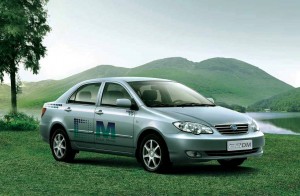
BYD showed a prototype plug-in hybrid electric vehicle at the North American International Auto Show in Detroit during January of 2008.
Senior executives at Volkswagen AG and privately-held BYD have signed a memorandum of agreement to “explore the options for partnership in the area of hybrids and electric vehicles powered by lithium batteries.”
BYD, short for Build Your Dreams, showed a prototype plug-in hybrid electric vehicle at the North American International Auto Show in Detroit during January of 2008. The company claimed at that time that the complicated series and parallel hybrid drive system would add about $6000 in cost to one of its small sedans. The fledgling Chinese automaker is a major international supplier of rechargeable batteries for cell phones, computers, digital cameras, and personal electronics. U.S. based Berkshire Hathaway has taken a small, 10%, position in the company.
The VW link-up came after a visit by a delegation from the Chinese automaker headed by BYD’s Chairman of the Board of Management, Wang Chuanfu to VW’s Elektrotraktion Technology Center in Isenbüttel, Germany.
Wang and Dr Winterkorn, Chairman of the Board of Management of Volkswagen, signed the formal proposal after technical discussions and test drives of a variety of vehicles such as the Golf twinDrive and the prototype for an electric vehicle.
“Volkswagen will consistently expand its successful ‘BlueMotionTechnologies,’ said Dr Ulrich Hackenberg, Member of the Board for Technical Development at VW. “Hybrids and electric vehicles will play an increasingly important role, of course. Particularly for the Chinese market, potential partners such as BYD could support us in quickly expanding our activities.” Hackenberg personally briefed the Chinese managers.
The Chinese market is closed to outside companies who do not form partnerships with Chinese makers.
BYD makes nickel metal-hydride (NiMH) batteries, the design currently favored by Toyota in its Prius. BYD also makes a lithium-iron phosphate type of battery, FePO4, similar to lithium-ion batteries so beloved of the green movement, which can self ignite leading to fires. Still, many predict that, eventually, lithium ion batteries, which are lighter than metal hydrides, will become the favored battery in hybrid or electric vehicles.
BlueMotionTechnologies is a somewhat confusing marketing name that VW uses to refer to a wide variety of technologies that it claims are good for the environment. Recent developments such as s start-stop system and energy recovery by regenerative braking, electric drive and hybrid systems as well as turbocharged gasoline and diesel engines are included. Electric cars because of favorable treatment by proliferating greenhouse gas regulations are increasingly popular as a strategy used by automakers to continue selling other vehicles.
